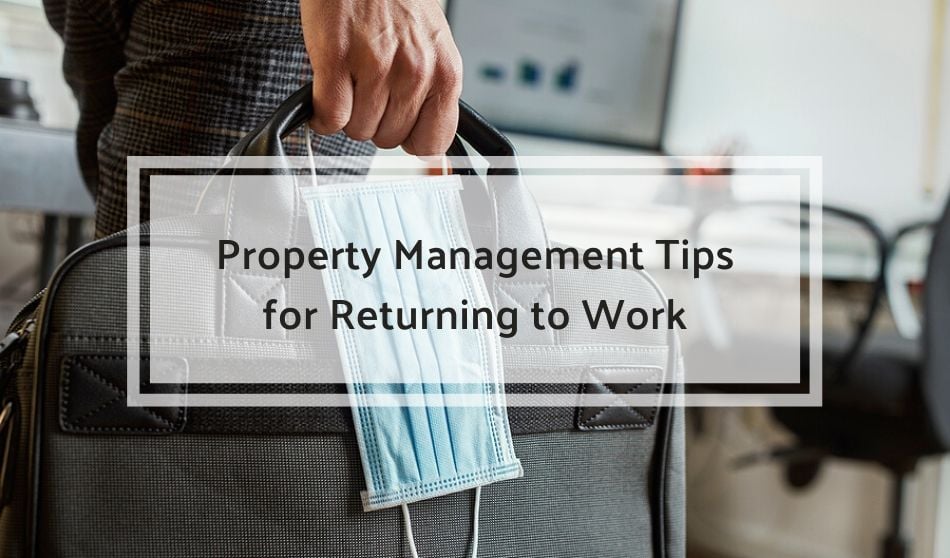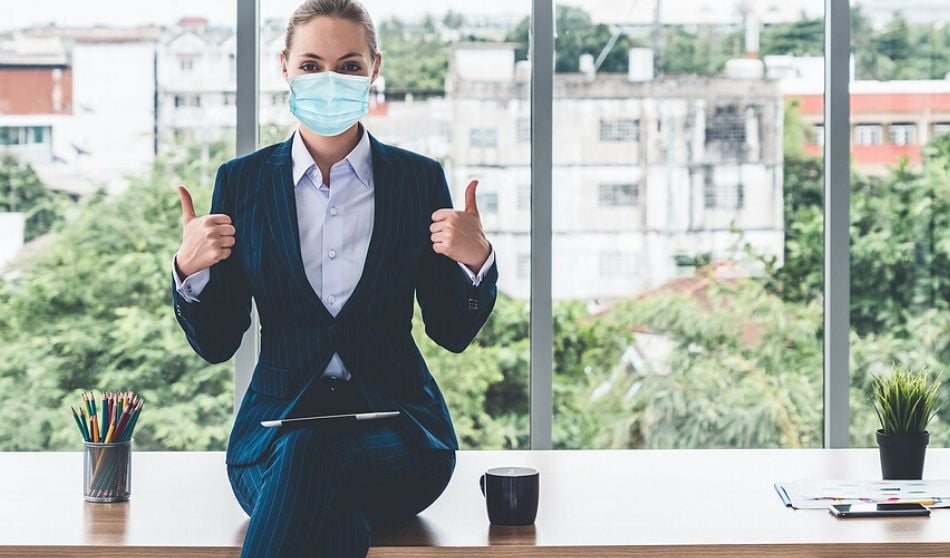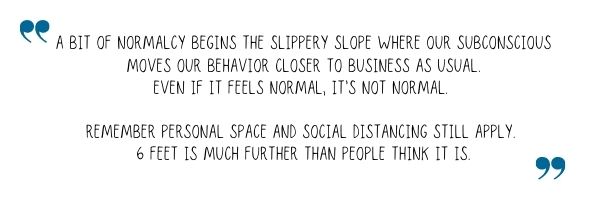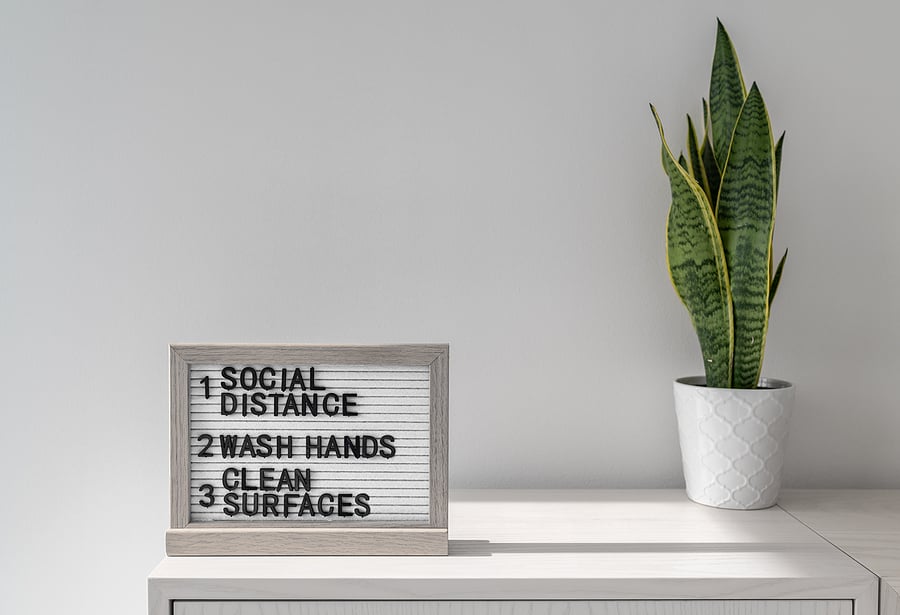
What a confusing time as states and counties seem to be in flux between reopening and reclosing and all the phases in between. In this uncertainty, many businesses are beginning to reengage with the public and people are being asked to return to work.
How to transition safely and fluidly between working from home and returning to the office is important to your health and the health of those you encounter.
Check out this regularly updated interactive map from the New York Times to
See How All 50 States Are Reopening (and Closing Again)
Returning to Work – Stress Management
It’s completely normal to be stressed and feel anxious about going back to work during these uncertain times.
The Center for Disease Control (CDC) reminds us that everyone is in an unusual situation so you’re not alone. They recommend to prioritize your mental health and be sure to take plenty of breaks to help with stress relief.
Stress takes its toll not only in our mental wellbeing but also on our sleep health and immune system. Because of this, it is vitality important while transitioning back to the office to prioritize stress management.
Preparation and planning also help alleviate stress and offers a feeling of safety and some semblance of control.
The two important themes for planning and preparation to return to work are illness avoidance (staying healthy) and illness prevention (keeping others healthy).
Top Priority: Illness Prevention and Avoidance
The level of action to take should correspond to the level of contact, interaction, and exposure. As been said many times but bears repeating, the four basic steps to prevent the spread and avoid catching ill are to:
- Wash Your Hands
You may be washing your hands more often than before but once you are in an office environment it is more important than ever to take care to reevaluate how long you are washing and how well. Remember that hand sanitizer is a good back up but shouldn’t replace good handwashing practices. - Keep Your Distance
6 feet is recommended but often people underestimate that distance. One trick is to imagine everyone holding and extending a yardstick or pool noodle. If your imaginary item could touch theirs, you’re too close. - Sanitize Surfaces Often
Consider wiping down your keyboard, mouse, desk, chair, and other touchpoints either at the start of your shift, at the end, or both. See the often missed touchpoints section below for more suggestions. - Wear Protective Gear
Masks and face shields are known to help stop the spread of disease. Add this gear to your wardrobe when necessary, required, and at times when social distance is difficult. Gloves are another item of protective gear often overlooked.
Whether face masks are mandatory or optional, when you wear one, let your eyes smile and your personality shine through.
Actions Tips that Impact You
It is important to remember to take care of yourself so you can then care for others. That care might take shape in planning your lunch in a way that minimizes your contact in a shared kitchen or breakroom to which restaurants offer delivery, pickup, or outside seating.
There are mixed messages about whether masks protect you, others, or both. In the event they do provide some protection for you and you choose to wear and/or one is required, consider if you’ll be using disposable or washable masks. In either case, have enough on hand to swap out often.
As mentioned above, get a proper amount of sleep, spend some time outdoors, take breaks for some movement and physical activity, and of course, give attention to your mental and emotional health. 
Protecting People in the Work Place
Remember the good ol’ days when rental offices used to have an open-door policy for tenants, vendors, and the public in general? Times have changed and adaptation is in play.
If you are in a position to do so, whether a property manager, private landlord, rental management company, or some other real estate industry office, consider if the timing is right for modified office hours or a ‘by appointment only’ policy.
Don’t bring illness to the office. Daily, before even leaving your house, take your temperature and check-in honestly with how you are feeling. Staying home when you have any symptoms of illness is the best policy for everyone.
In relation to your policies and procedures, reevaluate how you handle inspections, lease signing, and rent collection. Offer virtual inspections, tenant portal for online and cash network rent payments, and utilize electronic signatures to reduce face time. Less time in person means less opportunity to infect others.
When office doors are open or you meet with tenants, coworkers, property owners, and vendors consider ways to protect them from exposure such as:
- Keep hand sanitizer available in many locations.
- Post signs encouraging best practices and your policies.
- Arrange guest seating and employee desks for proper distancing.
- Decide policy on employee interactions regarding lunch and break rooms.
- Encourage tenants to pay rent online through their tenant portal or at a Cash Network location.
- Make sure your vendors are wearing appropriate PPE when they interact with tenants when required.

Landlords and property managers, remember to post policies and reminders for your tenants, vendors, property owners, and employees for safe practices.
Protecting Your Loved Ones
Returning to a daily office environment doesn’t necessarily pose any more risk than trips for shopping and errands. No one wants to be the cause of a friend or family member’s illness so the same precautions you’ve taken while in public should apply.
At a minimum, sanitize your hands before or just as you enter the house.
Better yet, think about showering and/or changing your clothes when you arrive home.
Consider disinfecting not only the touchpoints of your vehicle but also the front doorknob often.
Don’t forget your shoes! Sanitize as needed and remember to wash your hands after taking off and putting on shoes.
Often Missed Touchpoints to Sanitize
You’re likely already sanitizing your personal desk items like the keyboard and mouse. In addition to wiping down your vehicle such as the door handle, steering wheel, volume and temperature controls, etc… there are often missed touchpoints at home and in the office to remember:
- Chair backs and armrests
- Light switches and doorknobs
- Bathroom toilet and sink handles
- Kitchen and bathroom pump soap dispensers
- Handrailings
If you outsource your cleaning, you may want to ask your vendor to add the items like the above to their checklist.
Who is Vulnerable to Illness?
Everyone.
Not one person is immune to every illness and disease so we as a collective should remember to show care for each other. The pandemic adds a layer of vulnerability for the older population and/or those with immune-compromised health issues.
If in the above, you may need to consider if it is right for you to return to business as usual.
As a private landlord, you have the control to decide if a virtual office continues to be the right choice for you.
In a property management company or as an employee you may not have the luxury of deciding when the doors reopen.
However, if you are in one of the extra vulnerable groups you may wish to consider asking your employer for a modified work schedule, an extended work from home opportunity, or some other accommodations.
Resources for Returning to Work
Below are a few curated resources to help you return to work safely.
Center for Disease Control (CDC)
Employees: How to Cope with Job Stress and Build Resilience During the COVID-19 Pandemic
Coping with Stress
Prepare your Small Business and Employees for the Effects of COVID-19
Institute of Real Estate Management (IREM)
Pandemic Guide For Real Estate Managers | Resources for Reopening Your Properties
National Multifamily Housing Council (NMHC)
Reopening Resources
Final Thoughts
In returning to work safely while caring for yourself, your tenants, and loved ones it’s never too extreme to err on the side of caution and kindness. Here’s to good health!
RELATED READING FOR YOU:
- The Ultimate State Guide to Coronavirus Information: Plus District and Territories
- How to Manage Renters Moving During COVID-19
- Virtual Inspections Keep Renters Safe and Promote Social Distancing in Rental Properties





Thank you for sharing such valuable knowledge and practical advice! Your commitment to supporting property managers and helping them succeed in their roles is truly commendable, and I’m grateful for the invaluable guidance you’ve provided.
Great advice for property managers returning to work! These tips are perfect for staying organized, keeping tenants happy, and ensuring smooth operations. A must-read for anyone looking to get back on track!